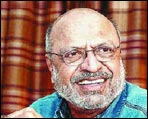
![]() Festivals
Festivals
![]() Durga Puja
Durga Puja
![]() Associations
Associations
![]() Learn
Bangla
Learn
Bangla
![]() Beng.
Marriage
Beng.
Marriage
![]() Art &
Craft
Art &
Craft
![]() Great Indians
Great Indians
![]() Beauty
Care
Beauty
Care
![]() Recipe
Recipe
![]() Astrology
Astrology
![]() Beng.
Section
Beng.
Section
![]() Bengal
Bengal
![]() Calcutta
Calcutta
![]() Beng.
Calendar
Beng.
Calendar
![]() Wallpapers
Wallpapers
![]() Movie
Movie
![]() Music
Music
![]() E-Card
E-Card
![]() Shopping
Shopping
![]() E-Puja Room
E-Puja Room
![]() News
News
![]() E-mail
E-mail
![]() Month's Events
Month's Events
![]() Weather
Weather
![]() Chat
Chat
![]() Education
Education
![]() Join Us
Join Us
![]() Advertise
Advertise
![]() Website links
Website links
![]() Link to us
Link to us
![]() Guest Corner
Guest Corner
![]() Services
Services
![]() WebSite
Design
WebSite
Design

Contemporary Indian filmmaker Shyam Benegal has been an important figure in the new wave of Indian directors. Benegal originated what has come to be called "middle cinema". He was initially involved in the advertising industry and produced over 900 advertisements before his interest turned to films.
Shyam
Benegal was born on 14 December 1934 at Aliwal, Hyderabad, British India
(now Andhra Pradesh, India). The son of a still photographer and one of
10 children, Benegal's love affair with motion pictures began when he
made his first home-movie using a hand-cranked camera at age 12. He was
nephew of the famous Indian Actor Director Guru Dutt.
As a young man, he went on to found a film society and get involved in
acting while studying at Osmania University where he earned an MA in economics.
After graduating, Benegal had been promised a lucrative job in Bombay.
He arrived to the city with only a few rupees in his pocket to discover
the job didn't exist. He eventually found a job as a copywriter at a large
ad agency. Soon he was promoted to writing scripts and directing advertising
shorts and commercials. He remained there for over a decade.
In 1969 he received a special fellowship to study operations of the Children's
Television Workshop in New York. Later he did a brief stint as a TV producer
in Boston.
Since then he has become a popular director in India, noted for creating
films sensitive to the role of women in Indian societies. His films are
also gaining international recognition and acclaim.
His film
directorial debut was Gher Betha Ganga in 1962. Benegal shot to fame with
Ankur 1973, which introduced Shabana Azmi, who also starred in Nishant
1975. Benegal did not direct his first feature film, The Seedling (1974),
until he was 40. The success that New India Cinema enjoyed in the 1970s
and early 1980s could largely be attributed to Shyam Benegal's quartet
Ankur (1973), Nishant (1975), Manthan (1976) and Bhumika (1977), which
were artistically superior yet commercially viable films. Tapping fresh
talent mainly from the FTII and NSD, Benegal has made several sensitive
and stimulating films.
Founder of the Hyderabad Film Society and a former Ad Filmmaker, Ankur,
his first feature film, is set in rural South India where Surya, a zamindar's
son arrives from the city to oversee his father's estate.
The film
is memorable for its engrossing details of rural life and its exposure
of the feudal system that is brutal and indifferent and is helped by a
powerful film debut by Shabana Azmi as the maidservant. Ankur not only
won several awards including the National Award for Shabana but also had
a good showing at the Box Office.
With Nishant, where a teacher's wife is abducted and gang-raped by four
zamindars and officialdom turns a deaf ear to the distraught husband's
pleas for help and Manthan, set against the backdrop of Gujarat's fledgling
dairy industry, Benegal continued to address the viewer in a strict cinematic
language bereft of commercial skills.
Bhumika looks at an individual's search for identity and self-fulfillment.
The film is broadly based on the life of well-known Marathi Stage and
screen actresses of the 1940s, Hansa Wadkar who led a flamboyant and unconventional
life.
Unlike
most New Cinema Filmmakers Benegal has had private backers for many of
his films. Following the success of these four films, he was backed by
film star Shashi Kapoor for whom he made Junoon (1979) and Kalyug (1981).
The former set in the turbulent period of the Indian Mutiny of 1857 is
one of Benegal's most stylish films and one which

is meticulously detailed and visually arresting and one that gave him much satisfaction but Kalyug, a complex narrative based on the Mahabharat in spite of some great moments doesn't quite come off.
In the 1980s however with the collapse of the New Cinema, Benegal's films have not had proper releases except a few like Mandi (1983). The 1980s also saw him turn to TV where he directed serials like Yatra (1986) for the Indian Railways, and of course one of the biggest projects undertaken on Indian Television, Bharat ek Khoj (1988) a serial based on Nehru's Discovery of India.
His later
films are Suraj ka Satwa Ghora, Mammo (1994), Sardari Begum (1996) , The
Making of the Mahatma (1996) – on Gandhiji’s life, Zubeida (2001) and
a tribute to Netaji Subhas Bose the Indian Freedom Fighter Netaji Subhas
Chandra Bose: The Forgotten Hero (2005), which rose much controversy.
Besides this he has directed a numerous documentaries for Television and
film.
He was awarded the Padma Shri in 1976 and the Padma Bhushan in 1991.
GREAT INDIANS || BENGALI SECTION || BENGALI MARRIAGE || WALLPAPER || BENGAL || WEATHER || E-CARD
MOVIE || WEBSITE LINKS || ASSOCIATIONS || SHOPPING || ASTROLOGY || MUSIC || BEAUTY CARE || NEWS
GUEST CORNER || FEEDBACK ||LINK TO US || FOR ADVERTISING || SERVICES || CONTACT || EDUCATION || JOIN US
Graphics, Sound or content copied or produced in part or whole in any media will be illegal.
Persons or websites caught using our material will be penalized.
Privacy Statement || Copyright
Copyright ©1999-2014 BANGALINET.COM